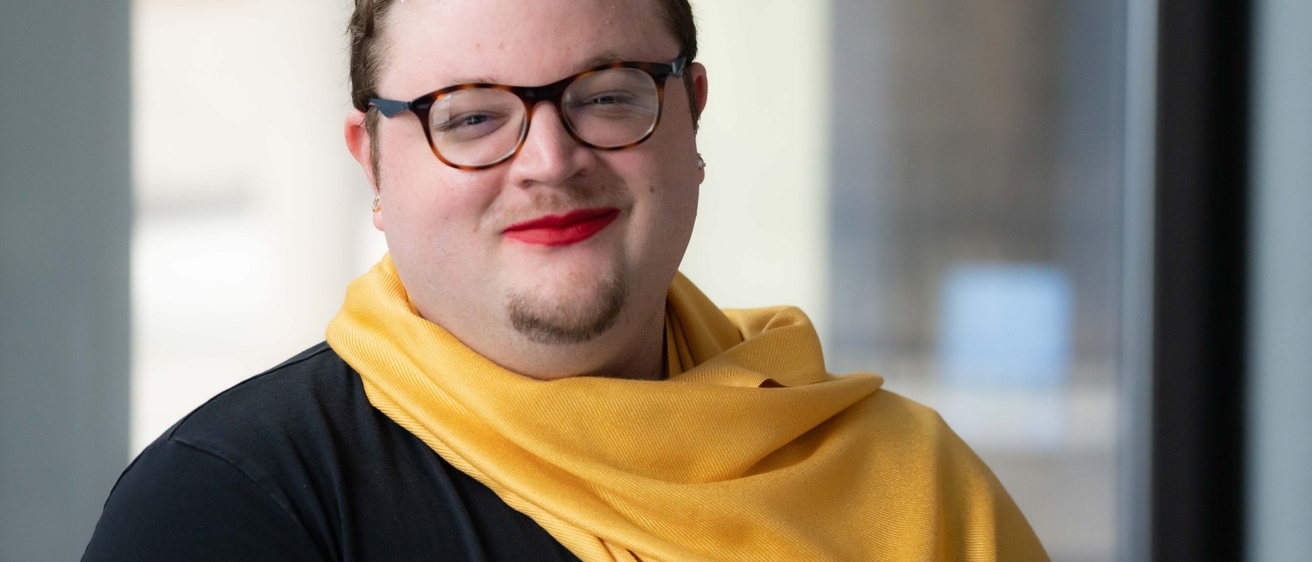By: Claire Quigle
Alex C. Lange, a graduating doctoral student in the Higher Education and Student Affairs program, researches higher education and transgender students.
This research is within the broader context of seeking to understand how higher education lives up to its mission and goals of equitable access, experiences, and outcomes for college students.
Lange’s research was recently recognized when they received the Graduate Research Excellence Award for Social Sciences. Lange received the award from the University of Iowa Office of the Vice President for Research. They were one of four people from the UI College of Education who received recognition.
The graduate research excellence award honors students in terminal degree programs conducting research and scholarly activity that is recognized as highly original work and makes a significant contribution to the field.
One nominator wrote, “Relative to other doctoral students at Iowa and those in higher education programs elsewhere, Alex is extraordinary. The veracious energy they gave to their student affairs career prior to their doctoral education has translated beautifully to Alex’s scholarship. Alex’s methodological toolkit is rich and deep, developed by their intensive methods coursework and their collaborative research endeavors.”
The nominator went on to write, “Alex’s dissertation is just one slice of their scholarly agenda to enact equity-focused education. Their 10 refereed journal articles, coupled with their dissertation, illustrate a well-constructed research agenda that will keep Alex focused on scholarship for many years into the future.”
Another nominator wrote that Lange conducted a national qualitative study, which involved participant recruitment, research design, research execution, and coordinating research teams. The nominator wrote that these practices are consistent with what many faculty do, and to accomplish these tasks as a doctoral student is especially noteworthy.
“As researchers, we always hope participants benefit from the studies we undertake,” Lange says. “Being recognized by Iowa for this work has proven these students' time and effort will move the needle on making trans students' college experiences ones where they can thrive and flourish.”
Since 2018, Lange has worked alongside 24 transgender college students across the country, coming to understand the role college plays in their lives. These students attend different types of institutions, come from different parts of the country, and represent various racial, gender, ability, and sexual identities. So far, Lange says they have learned a great deal about how students look for a college and how their college-going experiences affect their sense of self.
Lange has worked with queer and trans youth since 2010. First as an undergraduate student at an LGBTQ community center in Florida, then as an assistant director of the LBGT Resource Center at Michigan State University. They were then invited to be apart of the first National Study of LGBTQ Student Success, housed at Michigan State University. They were a part of that team for more than four years.
“Overall, this research is both personal and professionally motivated,” Lange says. “As someone who is queer and trans, I want higher education to be a place where LGBTQ people across racial, gender, disability, faith, and class identities can thrive! Higher education can be a place of fundamental transformation and great stagnation. As an equity-based scholar, I want to lean into the former and challenge the latter through my work.”
In the future, Lange hopes to help co-launch the next National Study of LGBTQ Student Success alongside brilliant scholars and co-conspirators. They want to keep in touch with the students they have been following and have goals of learning what other effects college has on their lives after graduation, beyond income, job placement, or political beliefs.
“I am committed to making the participants' brilliance accessible to everyone, from fellow scholars and educators to state and federal policymakers,” Lange says. “This award-rightly or wrongly-gives a greater sense of legitimacy to these participants' voices and what their viewpoints tell us as researchers and educators about higher education.”
